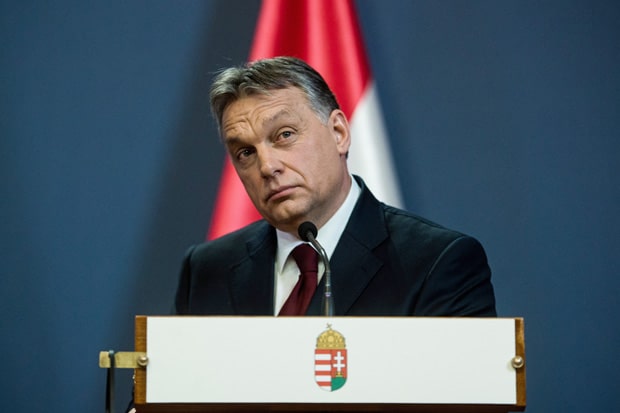Budapest has been shaken by several days of mass street demonstration against plans by Viktor Orban’s government to introduce a tax on the internet. According to the media, 100,000 Hungarians came out onto the streets of Hungary’s capital to tell the prime minister “no”.
In and of itself, the internet tax is a weak excuse for the organisation of 100,000-strong demonstrations. And, of course, demands to abolish the tax turned into demands for the resignation of Hungary’s ‘dictatorial’ and ‘corrupt’ government. Attacks were also launched on government buildings: as one, internet users pelted them with stones, notebooks and mobile phones.
Other signs of a ‘Hungarian Maidan’ were also evident: demonstrators defiantly jumped around chanting “He who does not jump pays the tax” (the Ukrainian version of this standard spectacle is “He who does not jump is a Moskal”). Local human rights defenders declared that introducing a tax on the internet is an assassination attempt on freedom of speech unacceptable for a democracy.
Among the demonstrators was the U.S. charge d’affaires in Hungary, Andre Goodfriend, who previously reported that the US authorities had banned six Hungarian nationals close to the Hungarian prime minister from entering the country.
It appears that Washington was protesting against the corrupt practices of these Hungarian nationals and expressed its displeasure to Viktor Orban in Brussels. On her Twitter page, the European Commissioner for Competition, Neelie Kroes, backed the street demonstrations and called for those who still had not done so to join them.
Western media write that Orban is under the influence of Putin. Orban himself has had to state more than once that he is not a pro-Russian but a pro-Hungarian politician, but he continues to be accused of yielding to pressure from Moscow. And no wonder: he has introduced restrictions on the work of foreign companies in the country, has too much power concentrated in his hands, and has approved Hungary’s neoliberal Constitution.
Orban is guilty before European democracy in a number of ways. As the father of five children, he resolutely opposes attempts to register the cohabitation of same-sex couples as ‘marriage’. He was also opposed to economic sanctions against Russia, calling them nonsensical, and saying they would do more harm to EU countries than to Russia. In addition, he is calling for compensation from Brussels for the losses incurred by Hungarian manufacturers as a result of curtailed cooperation with their Russian partners.
The head of the Hungarian government is not able to withstand all pressure, however. It was not long before Orban had to declare that Hungary stood with Germany in its assessment of events in Ukraine, and that the introduction of sanctions was a justified move.
It is easy to conclude that the change in the Hungarian prime minister’s initial position was a consequence of pressure from Berlin.
Thus, representatives of Deutsche Telekom’s subsidiary Magyar Telekom, Hungary’s largest internet company, have expressed their outrage at Orban’s plans to introduce a tax on the internet. Berlin is also putting pressure on Orban in other ways. Following German Minister of State for Europe Michael Roth’s visit to Budapest during the street demonstrations, the Hungarian prime minister declared that the government had listened to the people and the tax would not be introduced.
Yet the battle formations of a Maidan-style protest movement in Hungary remain ready to go. The leader of the protests, liberal Balazs Nemes, has reported that the protesters are in touch with each other and are ready to go back out onto the streets the instant that the authorities decide to launch an offensive on their civil rights. Balazs Nemes has referred to Viktor Orban’s leadership style as “the most appalling tyranny”.
The Hungarian prime minister’s independence, including with regard to Russia, has long irritated both Brussels and Washington.
Viktor Orban’s statements regarding his intention of finding allies in Europe capable of opposing the introduction of new sanctions against Russia together have not gone unnoticed.
Western capitals have been particularly outraged by the fact that on 4 November 2014, the Hungarian parliament passed a law allowing the construction of the South Stream pipeline to take place in Hungary, despite the position of the European Commission. Thanks to this law, Hungary now has a legal basis for refusing to comply with the requirements of the EU’s Third Energy Package.
Protests in Budapest against “the most appalling tyranny” are a warning to Viktor Orban, and a reminder of the fate of another Viktor – Viktor Yanukovych.
The street protests organised in the Hungarian capital should also be regarded as a warning to eastern European ‘Russophiles’ like Slovak Prime Minister Robert Fico or Czech President Miloš Zeman, since their attitude towards anti-Russian sanctions and events in Ukraine is much like that of Orban.


